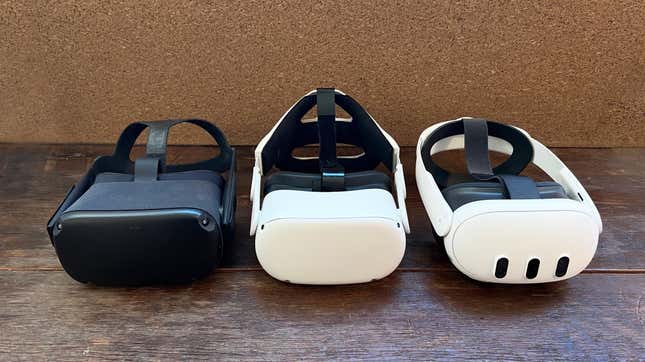
All that metaverse tech — whatever that term means at this point — will get a big connectivity boost thanks to federal regulators.
Hands-On With Meta Quest 3
The Federal Communications Commission (FCC) unanimously gave the thumbs up to a few of the biggest companies making VR hardware in its Thursday meeting, according to a press release. The commission says even more devices can operate at the 6GHz wireless band without a need for a license. This would be for devices operating at very low power (VLP) across a short distance with high connection speeds, which lets VR and AR devices work within 850 MHz of spectrum.
The FCC said this move would “enrich consumer experiences and bolster the nation’s economy.” Regulators stressed devices will be restricted to that VLP level.
This category includes virtual reality and augmented reality wearables such as those being developed by Meta and now Apple. These devices could use the short-range connectivity to hook up to smartphones or any other device.
Companies including Google, Facebook (now Meta), Apple, and Microsoft all petitioned the FCC for the 6GHz wave back in 2019, according to The Verge. They could make use of the sub-6GHz waveband unlicensed, but the companies have long been trying to avoid pesky licensing issues while using the most up-to-date connectivity standards.
“The new rules however are careful to limit these devices to very low power levels and subject them to other technical and operational requirements that will permit these devices to operate across the United States while protecting incumbent licensed services that operate in the 6GHz band,” the FCC said in its release.
FCC Chairwoman Jessica Rosenworcel the 6GHz airwaves are where the U.S. can develop “new wearable technologies,” according to Bloomberg.
It might be a boon to Apple and Meta’s ambitions, wherever that may actually go. Apple reportedly planned to create some kind of cheaper version of the Vision Pro, probably without that pointless exterior screen. Meta just released its Meta Quest 3 and Ray-Ban Smart Glasses, but its real ambition is to somehow slim down its augmented reality tech to the point it can work in AR glasses.






